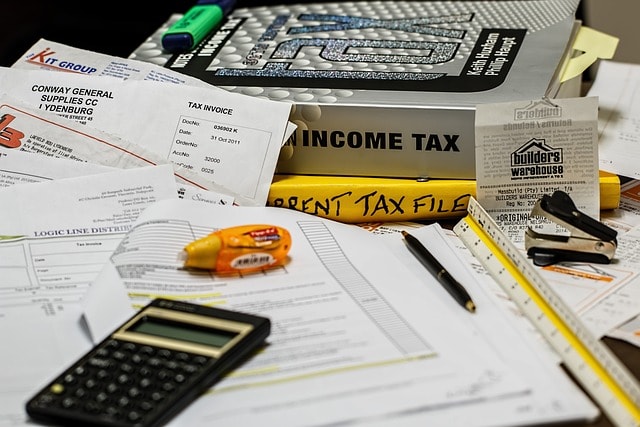What are 1099 Tax Deductions?
Independent contractors receive a 1099 to report their income.
As a self-employed individual, understanding 1099 tax deductions is crucial to minimize your tax bill. A 1099 tax deduction is a business expense that can be subtracted from your taxable income, reducing the amount of taxes you owe. Tax deductions are only for business expenses.
To qualify as a 1099 tax deduction, the expense must be related to your business and not personal in nature. Common examples of 1099 tax deductions include home office expenses, business use of car expenses, travel expenses, and professional fees. By carefully tracking and reporting these expenses, you can significantly lower your taxable income and, consequently, your tax bill.
Who must file a 1099?
Individuals who work as independent contractors or freelancers will typically have their income reported on a 1099 form. Businesses that use contracted services and pay over $600 must report it on a 1099.
If you worked as a contractor, you should receive your 1099 by January 31 for work performed during the previous calendar year. You’re required to include 1099s with any other tax information when you file your taxes by the IRS deadline, April 15.
Common 1099 filers include:
- Independent contractors.
- Freelancers.
- Self-employed workers.
- Sole proprietors.
What are the most used 1099 Deductions?
If you’re self-employed, you must file your expenses on Schedule C of Form 1040. Ensure you know what you can include to reduce the amount you owe at tax time. Independent contractors can deduct any amount paid for business licenses and taxes related to their operations. The self-employment tax must be reported using Schedule SE, which also includes the deduction calculation.
The following is for information purposes only and does not constitute tax advice. You are strongly encouraged to speak with a tax professional for comprehensive advice.
Here are the 10 most common business tax deductions for 1099s.
Business Insurance Premiums
Self-employed individuals who purchased insurance for their self-owned business can deduct it as a business expense. Examples of business insurance include fire, flood, malpractice, general liability, and business interruption insurance.
Business insurance expenses are recorded on line 15. You cannot record any personal insurance as a business expense. Car insurance is recorded on a different line.
Car Expenses
When it comes to business vehicles, you can either deduct mileage (which we’ll cover shortly) or the business portion of actual car expenses. The latter is known as the actual expense method.
Examples include lease payments, tolls, maintenance and major repairs, registration, parking costs, and registration. You’ll record tax-deductible car expenses on Line 9. You can also deduct travel expenses related to a business trip or other required travel expenses.
Cell Phone Costs
You can deduct cell phone costs if you use your cell phone for work. You must calculate the percentage of your phone bill used for business purposes. If you have a separate line for just work, that makes the process easier.
You’ll have to provide evidence of your business use, which could include using the phone or apps for business activities. You can list cell phone expenses as part of Other Expenses in Part V.
Commission and Fees
If you work for an on-demand service, such as Lyft or DoorDash, you can deduct the fees the company takes. You do not want to pay taxes on the money you never receive.
Real estate brokers and sales professionals can also deduct agent fees, which are fees or commissions paid to non-employees to generate revenue. Commission and Fees are recorded on line 10.
Depreciation of Assets (Section 179)
Business equipment and machinery often depreciate from business use. Examples include everything from construction equipment to commercial kitchens to office computers and furniture.
You can deduct the depreciation as a business expense under Section 179. You must include a completed IRS Form 4562 if you want to take this deduction. Section 179 deductions are recorded on Schedule C, line 13.
Health Insurance Premiums
Self-employed people can deduct the insurance premiums they pay for business coverage. Self-employed workers have a lot of options when it comes to deducting health insurance and medical costs. You will include health insurance costs on IRS Form 1040.
Home Office Deduction
If you work from home or use a home office as a primary business location, you may be able to deduct home office expenses. Homeowners can deduct a proportion of their property taxes and mortgage interest as part of the home office deduction. There are some specific rules to the home office deduction.
For example, you must use the space exclusively for business purposes. Office supplies used in the home office are deductible if they are used for business. You have two options for calculating this deduction.
The simplified option allows you to multiply your home office square footage by an IRS-determined rate, currently $5 per square foot, up to 300 square feet. Individuals can claim a maximum of $1,500 for the simplified home office deduction method.
The other option is to calculate the square footage used for a home office as a percentage of your home’s total and then multiply that percentage by your rent/mortgage, utility bills, and property taxes. You can also deduct direct business expenses fully under the regular method. You will record this expense on line 30. You must fill out IRS Form 8829 if you are using the regular method for the home office deduction.
Mileage
You can use the standard mileage deduction instead of a total car expense deduction. This simplified process provides a standard reimbursement for miles driven while on the job (no, commuting to work does not count). You should keep detailed records of each trip’s date, mileage, and purpose if you drive for business.”
The deduction was 65.5 cents per mile for 2023 and went up to 67 cents per mile in 2024.
Supplies
Work supplies are a broad category that essentially includes any items necessary to complete work. Examples include office supplies, tools, and craft supplies.
Record work supplies on line 22.
Travel
Independent contractors can deduct the cost of travel expenses with a specific business-related purpose. You can deduct travel expenses if, per the IRS, the travel was overnight, away from your residence, and primarily for business. In addition, self-employed individuals can write off half the cost of meals related to business travel.
Examples of travel costs include lodging, airfare, rental cars or local transportation, and business meals. Record travel expenses on line 24a.
Are there other 1099 Deductions?
You could potentially deduct other business expenses that are not as common as the previous 10 listed. For example, you can write off costs associated with hosting a business website.
You can use these deductions to reduce your self-employment taxes.
Advertising
You can deduct costs related to advertising and marketing campaigns. You can also deduct expenses related to market research, which is essential for understanding your target audience and planning effective marketing strategies. Some examples include printing and distributing flyers, running social media ads, paying for PPC or Google AdWords campaigns, or contracting a marketing and PR firm.
Record advertising expenses on line 8.
Contract Labor
You could deduct those costs if you used contract services, such as an IT firm. Professional services, such as hiring a lawyer, and employee wages are recorded elsewhere.
Record contract labor costs on line 11.
Employee Benefits
Independent contractors with employees can deduct costs for benefits programs. Examples include health insurance and education services.
Do not include your own health insurance premiums, though. Record employee benefits costs on line 14.
Employee Retirement or Pension Plan Contributions
You can deduct your contributions to employee accounts if you administer an employer retirement plan, such as a 401(k) or profit-sharing. Do not include your own retirement savings.
Types of retirement plans available for self-employed individuals include SEP-IRAs, SIMPLE IRAs, and Solo 401(k) plans. You can contribute up to $23,500 to a Solo 401(k) for the 2025 tax year, plus an additional $7,500 if you are age 50 or older. The total maximum contributions to a self-employed 401(k) cannot exceed $70,000 for 2025, not counting catch-up contributions. Contribution limits for retirement plans are adjusted annually by the IRS
Form 1040, Schedule 1 is used to deduct contributions to SEP, SIMPLE, and qualified retirement plans. Record employee retirement contribution costs on line 19.
Employee Wages
You can also deduct employee wages, commissions, and bonuses. This deduction is straightforward.
Record employee wage costs on line 26.
Education Expenses
Independent contractors can deduct the costs related to educational expenses that help maintain or improve their business skills.
Interest (Mortgage)
The mortgage interest deduction is intended for commercial properties that are not your primary residence. For example, if you purchased an office building to conduct business and have mortgage payments, you can deduct the interest paid as a business expense. You should determine what percentage of mixed-use expenses is deductible based on actual business use.
You must file the interest costs on Form 1098, which you may receive from your mortgage lender. Record mortgage interest on line 16a.
Interest (Other)
You could deduct the interest if you took out a business loan, used a business line of credit, or business credit cards. For example, if you took out a term loan to finance a business goal, the interest you paid during the year counts as a tax write-off.
Business credit cards and lines of credit are also increasing in popularity. Knowing the interest paid on them gives you a tax deduction, which encourages more small business owners to use these financing methods.
Record other interest costs on line 16b.
Legal and Professional Services
Self-employed people and independent contractors can deduct costs for payments to licensed professionals. Examples include lawyer fees and tax professionals (such as an accountant who helps you file your Schedule C).
Record these costs on line 17.
Office Expenses
We already discussed home office deductions, but what if you use an office space other than your primary residence? You can deduct those costs on line 18.
Professional Fees
Professional fees are a type of business expense that can be deducted from your taxable income. These fees include payments made to professionals such as lawyers, accountants, and consultants for services related to your business. To qualify as a deductible professional fee, the service must be related to your business and not personal in nature.
For example, if you hire a lawyer to review a business contract, the fee paid to the lawyer can be deducted as a business expense. Similarly, fees paid to an accountant for preparing your business taxes or to a consultant for business strategy advice are also deductible. These deductions help reduce your taxable income, making it essential to keep detailed records of all professional services used.
Qualified Business Income Deduction
Independent contractors can take advantage of the Qualified Business Income (QBI) deduction, which allows eligible self-employed individuals to deduct up to 20% of their qualified business income (QBI). This deduction, introduced under the Tax Cuts and Jobs Act, includes eligibility criteria and limitations based on income thresholds, and it is particularly beneficial for those with pass-through income. Independent contractors can also deduct the costs related to education that helps maintain or improve their business skills.
Rent or Lease Costs
It is possible to deduct costs related to renting or leasing business vehicles, machinery, and equipment. You can also deduct expenses for renting or leasing business property.
Record costs for vehicles, machinery, and equipment on line 20a and property on line 20b.
Repairs and Maintenance
You can deduct the costs if you spend money repairing machinery, computers, etc., or renovating a working space by painting or redecorating. Record repair and maintenance costs on line 21.
Taxes and Licenses
1099 filers can deduct costs for business taxes and licenses. Self-employed individuals are responsible for paying their own social security and Medicare taxes, which are combined into the self-employment tax. Examples include business licenses, LLC or incorporation fees, and special accreditations. However, do not record your self-employment or income tax.
Record tax and license costs on line 23.
Utilities
Lastly, you can deduct the cost of utilities for worksites that are not at your home office. Utility costs for a home office are filed with the home office deduction.
Record utility costs on line 25.
What are the pros & cons of a 1099 vs. W2?
In most cases, your status as an independent contractor means you will file taxes with a 1099. If you have the option of joining a team as a W2 employee or remaining 1099 contractor, you should know the pros and cons involved.
This also applies when it comes to hiring your own employees.
W2 Pros & Cons
Here are the benefits and drawbacks of W2 employees.
Pros:
- Better for long-term employment.
- Employers withhold your taxes for you.
- There is no risk of misclassification.
- Easier to control work on a day-to-day basis.
- Better for work that is core to the business function.
Cons:
- It is usually more expensive (from the employer’s perspective).
- Both employers and employees face increased federal regulation.
- It’s more difficult to terminate employment (for both employer and employee).
- It can be too costly for non-core work or temporary needs.
1099 Pros & Cons
Here are the benefits and drawbacks of 1099 contractors.
Pros:
- It offers greater flexibility and freedom for employers and contractors.
- It’s often less costly (from the employer’s perspective).
- Better for temporary, seasonal, or one-off work.
- Contractors can start work immediately without having to be trained.
- Higher hourly wages for 1099 contractors.
- Employers don’t have to pay benefits.
Cons:
- More complicated tax filing for 1099 contractors.
- No benefits for 1099 contractors.
- Less committed and not long-term.
- Too expensive for long-term or core work.
Frequently Asked Questions
Here are some of the most common questions about 1099 deductions.
What counts as a business expense?
Business expenses include all sorts of costs, some of which you might expect to count. It’s important to have separate bank accounts and credit cards for business use.
When claiming a business expense, it must meet two conditions:
- It must be an ordinary expense typical of your industry.
- It must be necessary to help you perform your job duties.
When considering if something counts as a business expense, ask yourself: Did this purchase help me run my business? If the answer is yes, you should be able to write it off.
Too many contractors do not include viable expenses because they don’t think it qualifies. Ensure you include anything and everything that could help you legally lower your tax bill.
- It must be an ordinary expense typical of your industry.
- It must be necessary to help you perform your job duties.
When considering if something counts as a business expense, ask yourself: “Did this purchase help me run my business?” If the answer is yes, you should be able to write it off.
Too many contractors do not include viable expenses because they don’t think it qualifies. Ensure you include anything and everything that could help you legally lower your tax bill.
Business Expense Categories
Business expenses include all sorts of costs, some of which you might expect to count. It’s important to have separate bank accounts and credit cards for business use.
When claiming a business expense, it must meet two conditions:
- It must be an ordinary expense typical of your industry.
- It must be necessary to help you perform your job duties.
When considering if something counts as a business expense, ask yourself: Did this purchase help me run my business? If the answer is yes, you should be able to write it off.
Too many contractors do not include viable expenses because they don’t think it qualifies. Ensure you include anything and everything that could help you legally lower your tax bill.
Business expenses can be categorized into several types, each with its own set of deductible items. Understanding these categories can help you ensure that you are claiming all possible deductions:
- Operating expenses: These are expenses related to the day-to-day operation of your business, such as rent, utilities, and supplies. For instance, the cost of office supplies, internet service, and utility bills for your business premises fall under this category.
- Capital expenses: These are expenses related to the purchase or improvement of business assets, such as equipment, vehicles, and property. For example, buying a new computer for your office or a vehicle for business deliveries are capital expenses.
- Travel expenses: These are expenses related to business travel, such as transportation, lodging, and meals. If you travel to attend a business conference or meet a client, you can deduct the costs of airfare, hotel stays, and meals.
- Education expenses are related to education and training that help maintain or improve business skills, such as courses, workshops, and conferences. For example, attending a workshop to learn new industry skills or enrolling in a course to enhance business knowledge are deductible education expenses.
By categorizing your business expenses correctly, you can maximize your deductions and reduce your overall tax liability.
Depreciation Methods
Depreciation is a method of accounting for the decrease in the value of business assets over time. Several depreciation methods can be used, each with its own advantages:
- Straight-line method: This method involves depreciating the asset by the same amount each year over its useful life. It is simple and provides a consistent annual deduction amount.
- Accelerated method: This method involves depreciating the asset more quickly in the early years of its useful life. It allows for more significant deductions in the initial years, which can be beneficial for businesses looking to reduce taxable income sooner.
- Section 179 method: This method involves depreciating the entire cost of the asset in the year it is purchased. It is particularly useful for small businesses that want to take a significant deduction immediately rather than spreading it out over several years.
Choosing the right depreciation method depends on your business needs and financial strategy. Consulting with a tax professional can help you determine the best approach for your specific situation.
Self-Employment Tax Rates
As a self-employed individual, you are responsible for paying self-employment taxes on your net earnings from self-employment. The self-employment tax rate is 15.3% of your net earnings, which includes 12.4% for Social Security and 2.9% for Medicare. If your income exceeds certain thresholds, you may be liable for an additional 0.9% Medicare tax. This tax is in addition to your regular income tax, making it crucial to understand and plan for it.
One way to reduce the impact of self-employment taxes is to take advantage of the self-employment tax deduction. You can deduct half of your self-employment tax as a business expense on your tax return. This deduction helps lower your taxable income, reducing the overall amount of taxes you owe. For example, if your self-employment tax is $3,000, you can deduct $1,500 as a business expense, effectively lowering your taxable income by that amount.
Understanding and planning for self-employment taxes can help you manage your finances more effectively and ensure you are not surprised by a large tax bill at the end of the year.
What are some examples of expenses I can’t write off?
You can use various self-employment tax deductions, but be careful not to include expenses you can’t write off. Trying to write off a non-deductible expense can lead to audits and more tax penalties. Up to $5,000 in business startup costs can be deducted in the first year of operations.
Here are some examples of expenses you can’ write off:
- Federal income taxes, whether from a 1099 or W2.
- Property taxes on personal use property.
- Sales taxes from customers or clients who purchase your goods and services.
What is the maximum self-employment Deduction?
There is no monetary limit on total deductions, but itemized deductions may have their own limits. For example, your home office costs cannot exceed your income.
As an independent contractor, you want to include every write-off you qualify for. Otherwise, you’re giving your money away to the IRS.
Can I write off expenses if I get a 1099?
Yes, all self-employed individuals can write off business expenses. Self-employment includes 1099 contractors, freelancers, gig workers, and small business owners.
You do not need to be incorporated as an LLC or corporation to file tax write-offs for business expenses. Meals can be deducted at 50% during business-related travel. You can write off sections of your phone and internet bills that are used for business.
Do I need to keep receipts to write off expenses?
It is always a good idea to keep track of your business receipts for both tax purposes and your own records. Keeping great records can make deductions easier to claim come tax day. However, you’re only required to produce receipts for business expenses over $75 that you paid in cash. Other expenses are recorded in documents that could provide sufficient evidence in the case of an audit.
Per the IRS, Electronic information management has become the standard in the private sector… instead of continuing to use traditional paper books. In most cases, your bank statements and credit card statements provide the track record of your expenses.
1099 Deductions – Final Thoughts
1099 contractors don’t have federal income tax withheld on the money they earn. That can lead to a major tax bill at the end of the year. Depending on how much you earned, you could owe thousands or tens of thousands when you file your taxes.
You should take advantage of every opportunity to reduce your tax expenses. The best way to reduce your tax liability is to file all eligible business expenses as a write-off.
Business tax deductions include a wide range of expenses, some of which you might not know qualified. Carefully review your expenses to see what you could include when filing your taxes.
We strongly recommend consulting a tax pro or accountant when filing your taxes. While the information provided here is intended to help you identify deduction opportunities, we do not claim to offer tax advice.

















